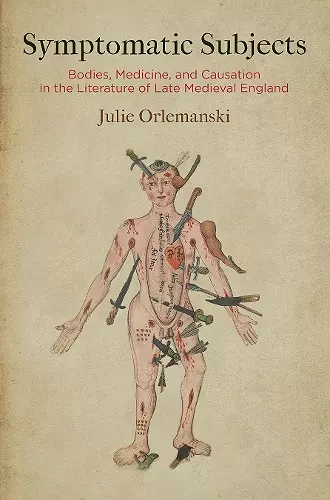Symptomatic Subjects
Bodies, Medicine, and Causation in the Literature of Late Medieval England
Format:Hardback
Publisher:University of Pennsylvania Press
Published:17th May '19
Currently unavailable, and unfortunately no date known when it will be back

In the period just prior to medicine's modernity, England saw a remarkable upsurge in medical writing. Julie Orlemanski's Symptomatic Subjects shows how late medieval English writers drew on the discourse of medicine to narrate anew the crossings—and the conflicts—between physiology and personhood.
In the period just prior to medicine's modernity—before the rise of Renaissance anatomy, the centralized regulation of medical practice, and the valorization of scientific empiricism—England was the scene of a remarkable upsurge in medical writing. Between the arrival of the Black Death in 1348 and the emergence of printed English books a century and a quarter later, thousands of discrete medical texts were copied, translated, and composed, largely for readers outside universities. These widely varied texts shared a model of a universe crisscrossed with physical forces and a picture of the human body as a changeable, composite thing, tuned materially to the world's vicissitudes. According to Julie Orlemanski, when writers like Geoffrey Chaucer, Robert Henryson, Thomas Hoccleve, and Margery Kempe drew on the discourse of phisik—the language of humors and complexions, leprous pustules and love sickness, regimen and pharmacopeia—they did so to chart new circuits of legibility between physiology and personhood.
Orlemanski explores the texts of her vernacular writers to show how they deployed the rich terminology of embodiment and its ailments to portray symptomatic figures who struggled to control both their bodies and the interpretations that gave their bodies meaning. As medical paradigms mingled with penitential, miraculous, and socially symbolic systems, these texts demanded that a growing number of readers negotiate the conflicting claims of material causation, intentional action, and divine power. Examining both the medical writings of late medieval England and the narrative and poetic works that responded to them, Symptomatic Subjects illuminates the period's conflicts over who had the authority to construe bodily signs and what embodiment could be made to mean.
"Orlemanski has provided scholars of all kinds of late medieval texts with a vital set of critical tools with which they might newly attend to the uncertain, plural, and fluid relationship between body, self, and other, and to the sustained medieval conversations that took place between literary and medical writings." * Journal of British Studies *
"Through her dynamic readings of texts that feature descriptions of bodily processes, Orlemanski shows that late medieval literary writers had come to see literary production as a space in which embodiment, textuality, and signification could be explored . . . [W]hat Orlemanski does in her literary readings is energizing and challenging. Her book's engagement with late medieval textuality and physicality will be of great interest to scholars in the field." * Studies in the Age of Chaucer *
"[V]ery erudite and interesting . . . Symptomatic Subjects is an impressive tour de force of literary and philosophical- especially semiotic-analysis. As the title indicates, it centers on causality as manifested in ailing human bodies. Having established the historical and philosophical background, the author turns to contemporary literature to substantiate and analyze the medical contents of several works." * Isis *
"
[P]atient, sustained, synthetic historical exposition plays into patient, sustained, coherent, often intricate readings. The casually browsing reader might suppose this to be a literary history of
physik, but Symptomatic Subjects is more intellectually gripping than that.
"An exciting, accomplished, and dazzling book. Julie Orlemanski is reinventing the field of literature and medicine, making a signal contribution to the medical humanities while gifting the field of Middle English studies with a bracing series of new interpretations that will influence our readings of medieval and other literatures for many years to come." * Bruce Holsinger, University of Virginia *
ISBN: 9780812250909
Dimensions: unknown
Weight: unknown
344 pages